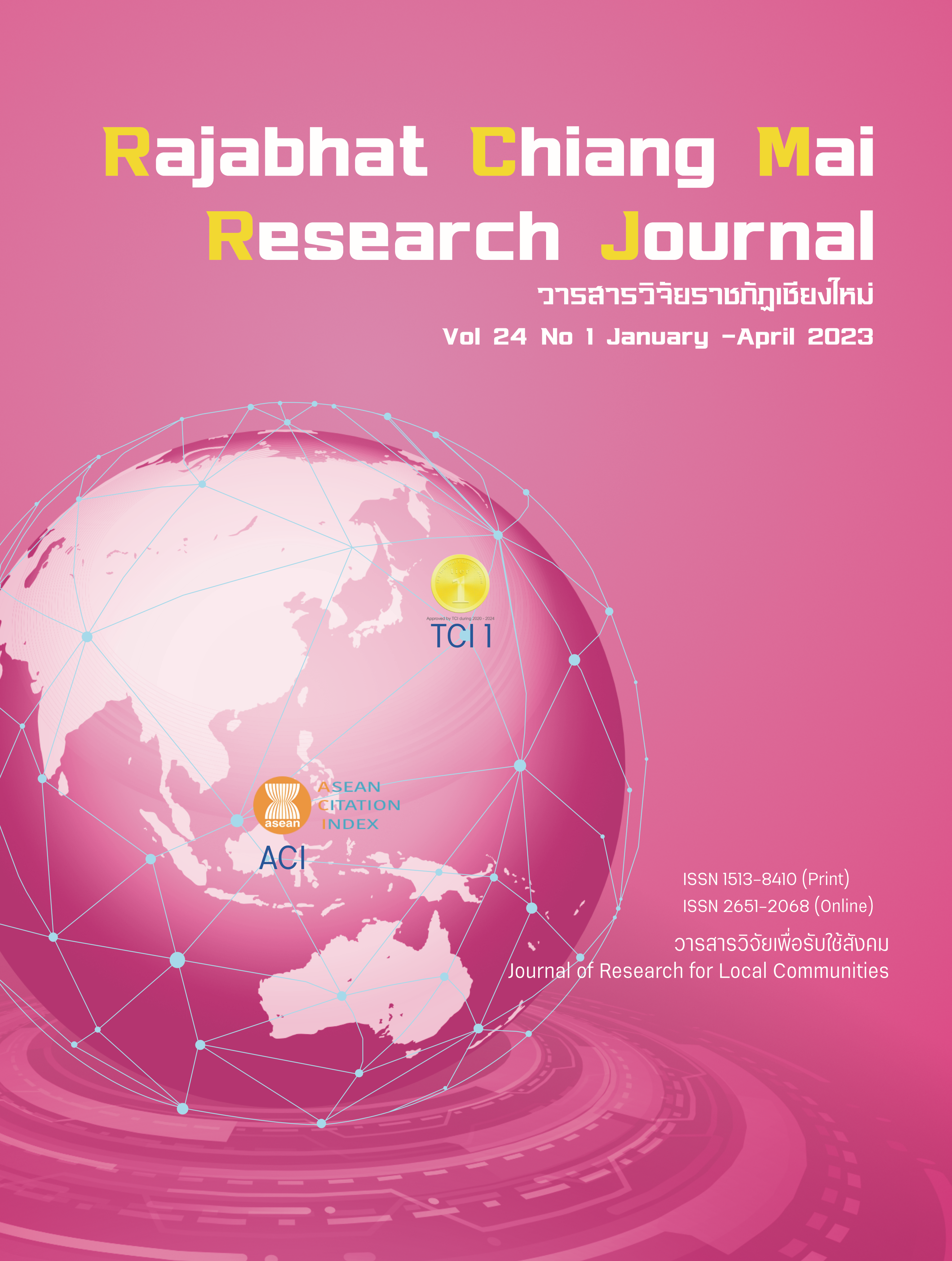Promoting Pre-Service Teachers' Multicultural Competence through Culturally Responsive Pedagogy-Based Art Education Course
DOI:
https://doi.org/10.57260/rcmrj.2023.261952คำสำคัญ:
Multicultural competence, Pre-service teachers, Culturally responsive teachingบทคัดย่อ
This study aims to enhance the multicultural competence of preservice teachers by integrating culturally responsive teaching into teacher preparation courses. The study was designed as participatory action research, and 36 pre-service teachers, one instructor, and two in-service teachers were involved. The study collected qualitative data through semi-structured interviews and observations and quantitative data through a multicultural competency self-assessment scale. Quantitative data were analyzed with descriptive statistics, whereas qualitative data were analyzed with content analysis. The study's findings indicate that culturally responsive teaching-based courses in teacher education encompass six fundamental areas: attitude, culture, consideration, ethics, and pedagogy (or ACCEPT). In addition, enrollment in pedagogy-based teacher preparation courses led to an increase in pre-service students' multicultural competence. Among the three components of multicultural competency, statistics indicate that knowledge changes the most, followed by skills and attitudes. The study argues that incorporating multicultural education concepts into teacher education courses fosters multicultural competency in future teachers, albeit to varying degrees.
Downloads
เอกสารอ้างอิง
Banks, J. (2014). An introduction to multicultural education. NJ: Pearson.
Barnes, M.E. (2016). The student as teacher educator in service-learning. Journal of Experiential Education, 39(3), 238 - 253. DOI:10.1177/1053825916643831
Byker, E. J., & Putman, S. M. (2019). Catalyzing Cultural and Global Competencies: Engaging Preservice Teachers in Study Abroad to Expand the Agency of Citizenship. Journal of Studies in International Education, 23(1), 84–105. https://doi.org/10.1177/1028315318814559
Dana, K. S. (2022). Culturally responsive teaching in the art room. (Master’s thesis, Grand Valley State University). https://scholarworks.gvsu.edu/gradprojects/194
Fox, W., & Gay, G. (1995). Integrating multicultural and curriculum principles in teacher education. Peabody Journal of Education, 70 (3), 64-82. DOI: 10.1080/01619569509538835
Gay, G. (1997). Multicultural infusion in teacher education: Foundations and applications. Peabody Journal of Education, 72 (1), 150-177, DOI: 10.1207/s15327930pje7201_8
Gay, G. (2002). Preparing for culturally responsive teaching. Journal of Teacher Education, 53 (2), 106-116. https://journals.sagepub.com/doi/10.1177/0022487102053 002003
Gay, G. (2010). Culturally responsive teaching: Theory, research, and practice (2nd ed.) Teachers College Press.
Gay, G., & Howard, T. C. (2000). Multicultural teacher education for the 21st century. The Teacher Educator, 36 (1), 1-16. https://doi.org/10.1080/08878730009555246
Gay, G. (2015). The what, why, and how of culturally responsive teaching: International mandates, challenges, and opportunities. Multicultural Education Review, 7 (3), 123-139, DOI: 10.1080/2005615X.2015.1072079
Kemmis, S., & McTaggart, R. (1988). The Action Research Planner. (3rd ed.). Victoria: Deakin University.
Knight, W.B. (2006). Using contemporary art to challenge cultural values, beliefs, and assumptions. Art Education, 59 (4), 39-45. https://doi.org/10.1080/00043125.2006.11651602
Knight, W. B. (2015). Culturally responsive teaching in art education. The International Journal of Arts Education, 13(1), 70–89. http://ed.arte.gov.tw/uploadfile/periodical/3459_70- 89.pdf
Krummel, A. (2013). Multicultural teaching models to educate pre-service teachers: Reflections, service-learning, and mentoring. Current Issues in Education, 16(1), 1-6. https://cie.asu.edu/ojs/index.php/cieatasu/article/download/1059/450/
Ladson-Billings, G. (2014). Culturally relevant pedagogy 2.0: a.k.a. the Remix. Harvard Educational Review, 84(1), 74-84. DOI:10.17763/haer.84.1.p2rj131485484751
Nawarat, N. (2018). Multicultural education critical perspectives and praxis in schooling. Wanida Karnpim Limited Partnership.
Rychly, L., & Graves, E. (2012). Teacher characteristics for culturally responsive pedagogy. Multicultural Perspectives, 14 (1), 44-49. DOI: 10.1080/15210960.2012.646853
Suwanma, P., & Srisuk, K. (2017). The Effect of Instructional Management Competencies of Teachers in Multi-Ethnic Classrooms. Journal of Education Khon Kaen University. 40(1), 73-84. https://so02.tci-thaijo.org/index.php/EDKKUJ/article/view/80494/ 73846. (In Thai)
ดาวน์โหลด
เผยแพร่แล้ว
รูปแบบการอ้างอิง
ฉบับ
ประเภทบทความ
สัญญาอนุญาต
ลิขสิทธิ์ (c) 2023 วารสารวิจัยราชภัฏเชียงใหม่

อนุญาตภายใต้เงื่อนไข Creative Commons Attribution-NonCommercial-NoDerivatives 4.0 International License.
1. บทความ ข้อมูล เนื้อหา รูปภาพ ฯลฯ ที่ได้รับการตีพิมพ์ใน “Community and Social Development Journal” ถือเป็นลิขสิทธิ์ของ Community and Social Development Journal มหาวิทยาลัยราชภัฏเชียงใหม่ และเพื่อให้เผยแพร่บทความได้อย่างเหมาะสมผ่านสื่อสิ่งพิมพ์และอิเล็กทรอนิกส์ ผู้เขียนยังคงถือครองลิขสิทธิ์บทความที่ตีพิมพ์ภายใต้ใบอนุญาต Creative Commons Attribution (CC BY) ซึ่งอนุญาตให้เผยแพร่บทความซ้ำในแหล่งอื่นได้ โดยอ้างอิงต้องอ้งอิงบทความในวารสาร ผู้เขียนต้องรับผิดชอบในการขออนุญาตผลิตซ้ำเนื้อหาที่มีลิขสิทธิ์จากแหล่งอื่น
2. เนื้อหาบทความที่ปรากฏในวารสารเป็นความรับผิดชอบของผู้เขียนบทความโดยตรง ซึ่งกองบรรณาธิการวารสารไม่จำเป็นต้องเห็นด้วยหรือร่วมรับผิดชอบใดๆ














